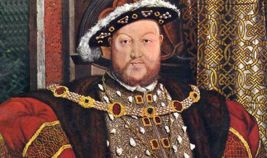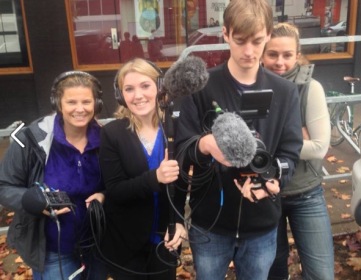“The universe is made up of stories not atoms…”
Muriel Rukeyser.
About a year ago I came across the above quote and realized that this principle has always been silently guiding my academic career and interests. I first discovered my love of history in high school, thanks to the storytelling abilities of one particular woman, Dr. Penelope MacGeorge. She had a unique ability to make the people and events of the past come to life in a way that made me reflect on my own relationship to them in the present. I felt inspired. At around the same time I also developed a love for film. Years later, I came upon the realization that these dual fascinations stemmed from the same conviction in the power and necessity of storytelling. It is through stories, not science, that we really come to understand ourselves and others. Stories help us gain perspective on our world. They help us communicate, to relate. Historians are first and foremost storytellers. So are filmmakers.
There seems to be an idea…that if history is objective and ‘done well’ it shouldn’t really move us. I completely disagree with this notion. We tell stories, we write histories, precisely to move us to think about the events of the past, and how those events may have something to tell us in the present. The best way to stimulate that thought and interest is to invoke an emotion, a physical response. Film is an extremely powerful tool that can help us to do just that.After coming to this realization I started to think more seriously about the potential of incorporating film into my own research, which looks at the ‘story’ that Henry VIII cultivated of himself through the material culture of his court. I expected that convincing my advisors of the value of film as a tool for doing history would not be easy. Academia and ‘entertainment’ don’t traditionally a partnership make. However, in a world so attuned to computer screens and digital media I knew that, like it or not, generations to come will look more and more to digital mediums for their history. It needs to be trained historians at the forefront of this venture. Plus, entertainment doesn’t have to be achieved at the expense of academic merit, which is something I hope to prove with my own project. Take even a Hollywood movie like Saving Private Ryan: sure, that film is more fiction than it is history, but I don’t think anyone can deny that those meticulously researched D-Day scenes relay a sense and feeling of the past, an emotional historical truth, which simply can’t be achieved through words.
 It
is precisely the emotive and sensory experience of film that offers the
historian a unique and unrivaled opportunity for the successful
dissemination of knowledge about the past. There seems to be an idea
(not doubt a hangover from the Rankean era) that if history is objective
and ‘done well’ it shouldn’t really move us. I completely disagree with
this notion. We tell stories, we write histories, precisely to
move us to think about the events of the past, and how those events may
have something to tell us in the present. The best way to stimulate
that thought and interest is to invoke an emotion, a physical response.
Film is an extremely powerful tool that can help us to do just that.
It
is precisely the emotive and sensory experience of film that offers the
historian a unique and unrivaled opportunity for the successful
dissemination of knowledge about the past. There seems to be an idea
(not doubt a hangover from the Rankean era) that if history is objective
and ‘done well’ it shouldn’t really move us. I completely disagree with
this notion. We tell stories, we write histories, precisely to
move us to think about the events of the past, and how those events may
have something to tell us in the present. The best way to stimulate
that thought and interest is to invoke an emotion, a physical response.
Film is an extremely powerful tool that can help us to do just that.Beyond UW: The Northwest Film Forum
Buoyed by these sentiments, last year I decided to take the bull by the horns and applied for a filmmaking comprehensive at the NorthWest Film Forum – a hub for Seattle filmmakers for over twenty years. I’d looked around a few other schools but chose the Forum because of its focus on hands on learning and community. The program is a one year intensive designed to teach students all areas of filmmaking, from production, to sound, to scriptwriting. The classes are all taught by industry professionals. I was nervous to start, as I knew that the majority of the students would have a very different background than mine, and likely more experience in the industry. But as I went through that first week of classes and met all the instructors, I was excited to discover that half of them had actually been history majors! It seemed like I wasn’t the only one to catch the film and history bugs at the same time!The Forum’s approach was just the hands-on real world experience I’d been looking for. It
 was
very personal and quite different than any of the classes I’d taken at
the university. We were out filming and using equipment on a daily
basis, and unlike other film programs that tend to have large class
sizes, there were only eight people total in my cohort. We meet for
three hours a day, five days a week, and if truth be told have developed
into what feels like a family—a slightly dysfunctional one, but a
family nonetheless.
was
very personal and quite different than any of the classes I’d taken at
the university. We were out filming and using equipment on a daily
basis, and unlike other film programs that tend to have large class
sizes, there were only eight people total in my cohort. We meet for
three hours a day, five days a week, and if truth be told have developed
into what feels like a family—a slightly dysfunctional one, but a
family nonetheless.I won’t lie: juggling film school, teaching, and graduate coursework at UW hasn’t been easy. It takes a commitment to late nights and a limited social life! But on reflection, it’s definitely been worth it. Exploring how different mediums can help me tell the stories that I think need to be told has really helped me to hone my voice as a writer, and as a filmmaker. I feel confident in what I want to say, why I need to say it, and through film I know that can reach the widest audiences with these important stories.
Rethinking the Dissertation
My time at the forum has also helped me to realize the value of community, and being able to use my skills as a historian to enrich that community is, I think, one of the most worthwhile things I could be doing. History is all about engagement after all. If I hadn’t made the decision to apply to film school I’d never have gained the confidence to approach my committee and the department about the possibility of adding a non traditional element to my dissertation. I give credit to my advisors, who were much more open to my goals and ideas than I had expected. In general I’ve been pleasantly surprised to find that the more people I speak to in the academy, the more excited they seem to be about the path I’m treading; none more so than Professor Purnima Dhavan, without whose support I’m not sure I’d be in this position. After
a year of film school and wanting to take my interests outside the
walls of the university I find myself in the exciting and uncharted
waters of creating a dissertation that is part documentary. My vision
for the project is to use film to recreate the space and feel of Henry
VIII’s court – to give viewers the experience of being moved by the
images of kingship that he projected using material culture, just as his
contemporaries would have been. I’ll need to mobilize all the skills
I’ve learned at the Forum to do this, but I’m excited for the challenge!
It feels like I’m riding the wave of what is a really exciting time for
the humanities. I see a future where more and more history PhD’s will
forge careers outside of academia and will use their knowledge, and
their stories, to have a significant impact in the world.
After
a year of film school and wanting to take my interests outside the
walls of the university I find myself in the exciting and uncharted
waters of creating a dissertation that is part documentary. My vision
for the project is to use film to recreate the space and feel of Henry
VIII’s court – to give viewers the experience of being moved by the
images of kingship that he projected using material culture, just as his
contemporaries would have been. I’ll need to mobilize all the skills
I’ve learned at the Forum to do this, but I’m excited for the challenge!
It feels like I’m riding the wave of what is a really exciting time for
the humanities. I see a future where more and more history PhD’s will
forge careers outside of academia and will use their knowledge, and
their stories, to have a significant impact in the world.Forging New Paths
To anyone thinking of pursuing a non-traditional path with their degree, my advice would be to think hard. Develop a clear goal of where you want to be and how you think you can get there. You need to have your goals firmly set in order for the project to be measurable, so that it can meet the academic standards required of such a degree. Once you have this in place the stakes of your work, and where it may lead you, will become clear. And then comes the fun part, you get to build a dissertation that you are not only passionate about but one that is specifically designed with your career goals in mind! Oh, and one more thing. Don’t be afraid to ask! One of the most interesting moments in my journey was when I prepared myself with a long list of reasons why I felt including a film element to my dissertation was valid and necessary, in the belief that I would receive significant pushback from both the graduate school and my department. I soon realized that these road blocks I thought I was going to have to smash through didn’t really exist! If you have a clear vision that you can articulate well I think you’ll find that people are much more supportive than you may think.In terms of my project, I hope it will show the academic merit of using film as a tool for doing history, and will prove, to steal a quote from perhaps one of the best films ever made, that “this is the beginning of a beautiful friendship.”

Comments
Post a Comment